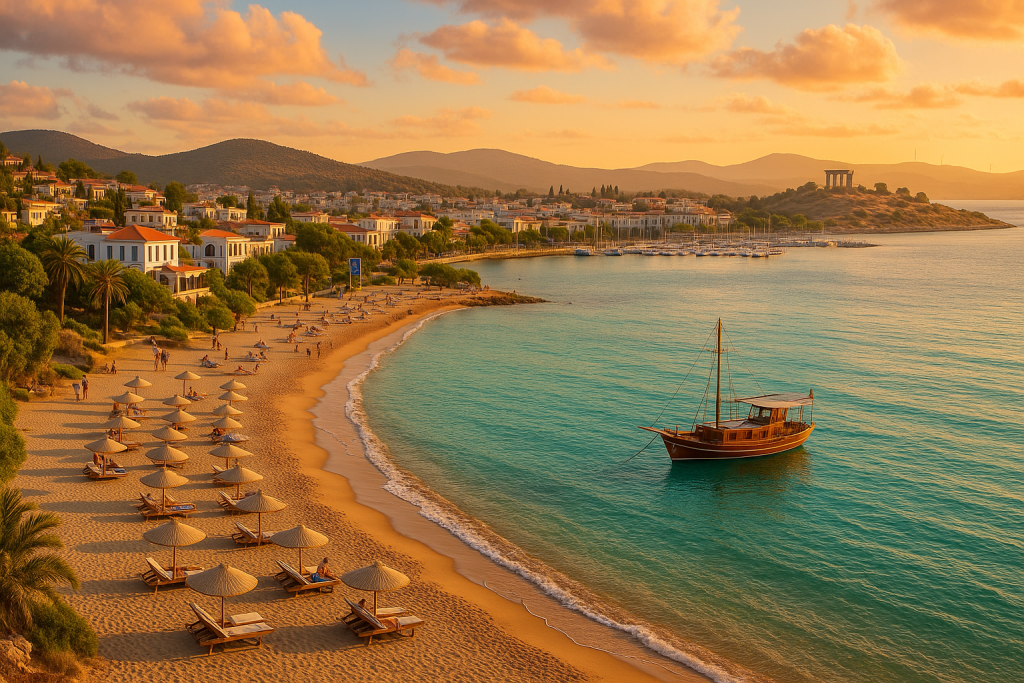The morning sun casts golden shadows across Altinkum’s pristine shoreline, where gentle waves lap against sand so fine and luminous it inspired the Turkish name meaning “golden sand.” Here, on Türkiye’s southwestern Aegean coast, ancient temples rise from hillsides dotted with olive groves, while modern eco-initiatives quietly transform this coastal haven into a blueprint for sustainable Mediterranean tourism. With its three Blue Flag beaches and new harbour facilities, Altinkum represents a compelling evolution in responsible travel—a destination where environmental stewardship enhances rather than compromises the authentic Turkish experience.
As Türkiye embraces a new era of conscious tourism, with the nation’s tourism income reaching $8.8 billion in early 2024, destinations like Altinkum demonstrate how environmental excellence can drive economic prosperity. This Bodrum region resort exemplifies the delicate balance between preserving natural heritage and providing world-class hospitality to the growing number of eco-conscious travellers seeking meaningful connections with place and culture.
A Tapestry of Ancient Wisdom and Modern Vision
The sacred history of Didyma—from which modern Didim and Altinkum take their cultural identity—stretches back to the 8th century BC, when this was a revered meeting place associated with Apollo and Artemis. Today, visitors can explore the magnificent Temple of Apollo, once one of Ancient Greece’s largest temples, where two of its original 122 columns still stand as testament to humanity’s enduring connection to this landscape.
This historical continuum informs Altinkum’s contemporary approach to tourism. Local communities have embraced the concept of “cultural sustainability”—preserving not just monuments, but the living traditions that give meaning to place. Traditional fishing boats still depart at dawn from the modern marina, their routes unchanged for centuries, while waterfront restaurants serve dishes that reflect millennia of culinary evolution along this strategic trade route.
The town’s commitment to heritage extends beyond preservation to active interpretation. Archaeological sites receive careful management that limits visitor impact while maximising educational value. Walking trails connect historical points of interest through native Mediterranean vegetation, creating immersive experiences that reveal the landscape’s layered story without compromising its integrity.
Sustainable Experiences That Inspire
Altinkum’s environmental credentials earned international recognition when eleven beaches in the greater Didim area received Blue Flag status, with the marina also achieving this prestigious eco-certification that recognises exceptional water quality, environmental management, and safety standards. This achievement reflects a comprehensive approach to coastal stewardship that extends far beyond beach cleaning.
The main Altinkum Beach, stretching 750 metres with its characteristic golden sand, remains a public space with free access—a deliberate policy that ensures sustainable tourism benefits extend to all visitors regardless of economic circumstance. The region’s remarkable 300 days of annual sunshine create year-round opportunities for low-impact outdoor activities, reducing the seasonal tourism pressures that plague many Mediterranean destinations.
Culinary experiences here celebrate both tradition and sustainability. Local restaurants increasingly source from nearby organic farms and family-run olive groves, while fishing cooperatives practice selective harvesting that maintains healthy marine ecosystems. Traditional mezze spreads showcase the region’s biodiversity—wild greens foraged from coastal hills, locally pressed olive oils with Protected Designation of Origin status, and cheeses from heritage goat breeds adapted to the Mediterranean climate.
For the adventurous, Altinkum serves as a gateway to Lake Bafa, a hidden gem surrounded by traditional villages and protected nature reserves, offering peaceful exploration opportunities away from coastal crowds. The lake’s unique ecosystem, where freshwater meets ancient seabed, supports endemic species while providing sustainable livelihoods for local communities through carefully managed eco-tourism activities.
Environmental Innovation in Action
The transformation of Altinkum into a model sustainable destination reflects both local initiative and national policy. Türkiye’s partnership with the Global Sustainable Tourism Council has established a comprehensive national programme, with implementation stages extending through 2025, positioning destinations like Altinkum at the forefront of Mediterranean sustainability efforts.
Water conservation represents a particular success story. Advanced treatment systems ensure that even during peak summer months, local aquifers remain protected while maintaining the pristine water quality that earned Blue Flag recognition. Solar installations on hotel rooftops and municipal buildings harness the region’s abundant sunshine, while waste management programmes achieve recycling rates that exceed European Union averages.
Transportation initiatives address one of tourism’s most significant environmental challenges. The well-developed dolmuş (shared taxi) network provides efficient public transport, while new cycling infrastructure connects accommodation areas with beaches and cultural sites. Electric charging stations along major routes support the growing number of visitors choosing low-emission vehicles, while pedestrian zones in the town centre prioritise walking over driving.
The economic impact demonstrates that environmental responsibility enhances rather than constrains prosperity. Local employment in tourism has grown by approximately 15% annually over recent years, with wages in sustainable tourism businesses consistently exceeding regional averages. This success attracts continued investment in renewable energy, sustainable architecture, and conservation programmes that further enhance Altinkum’s appeal to discerning travellers.
Practical Wisdom for the Conscious Traveller
Timing your visit optimises both environmental and experiential benefits. Late spring (May-June) and early autumn (September-October) offer ideal weather conditions while reducing pressure on infrastructure and natural resources. The shoulder seasons also reveal Altinkum’s authentic character, when local rhythms take precedence over tourist schedules.
Accommodation choices significantly impact your visit’s sustainability footprint. Family-run pensions and boutique hotels often demonstrate greater environmental commitment than large resort complexes, while providing more authentic cultural immersion. Many establishments now offer organic breakfast ingredients, solar-heated water, and locally crafted furnishings that support regional artisans.
Transportation from airport to destination presents opportunities for reduced impact. Shared shuttle services and public transport options eliminate the need for private transfers, while compact rental vehicles or electric scooters provide efficient local mobility. Walking remains the most rewarding way to discover Altinkum’s hidden corners—from secluded coves accessible only by footpath to family restaurants tucked away in residential neighbourhoods.
Engaging respectfully with local culture enhances both personal experience and community benefit. Learning basic Turkish phrases demonstrates respect and often leads to unexpected invitations and insights. Supporting businesses that employ local staff and source regional products creates economic ripple effects that strengthen sustainable tourism’s foundation.
A Vision Realised
Altinkum’s evolution represents more than environmental compliance; it embodies a fundamental reimagining of what Mediterranean tourism can become. Here, sustainability enhances rather than restricts pleasure, creating deeper connections between visitors and place while ensuring future generations inherit both natural beauty and cultural authenticity.
As global tourism grapples with its environmental impact, Altinkum offers tangible proof that responsible development can satisfy the most discerning travellers while protecting the very qualities that make destinations worth visiting. In choosing to explore this golden coast, conscious travellers become participants in a quiet revolution—one that promises to transform not just how we holiday, but how we relate to the world beyond our borders.


